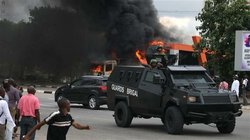 Human Rights Watch (HRW) has denounced a recent Nigerian court ruling that bans the movement led by jailed Muslim cleric Sheikh Ibrahim al-Zakzaky, calling on the Abuja government to reverse the ban, which prevents the group’s members from “exercising their right to carry out peaceful activities.”
Human Rights Watch (HRW) has denounced a recent Nigerian court ruling that bans the movement led by jailed Muslim cleric Sheikh Ibrahim al-Zakzaky, calling on the Abuja government to reverse the ban, which prevents the group’s members from “exercising their right to carry out peaceful activities.” RNA - A court in the capital Abuja ruled that activities of the Islamic Movement in Nigeria (IMN) amount to “acts of terrorism and illegality” and ordered the government to ban the religious group.
The move drew criticism from New York-based Human Rights Watch.
“The sweeping court ruling against the Shia movement threatens the basic human rights of all Nigerians,” said the HRW’s Nigeria researcher, Anietie Ewang. “The government should seek to reverse the ban, which prohibits the religious group’s members from exercising their right to meet and carry out peaceful activities.”
He also warned that the ban “may portend an even worse security force crackdown on the group, which could have dire human rights implications throughout Nigeria.”
The ban runs contrary to the Nigerian constitution and international human rights law, which guarantee the rights to freedom of religion, association and expression, the HRW added.
Ewang also warned that the ban “may portend an even worse security force crackdown on the group, which could have dire human rights implications throughout Nigeria.”
The ban was imposed on the Islamic group while the Nigerian constitution and international human rights law guarantee the rights to freedom of religion, association and expression.
According to Press TV, IMN members regularly take to the streets of the Nigerian capital to call for the release of Sheikh Zakzaky, who has been in detention since 2015. Nigerian forces have used live ammunition against the protesters.
Now 66 years old, the cleric was reportedly poisoned in prison and requires urgent medical care abroad, according to members of IMN.
Security forces killed at least 20 members of the movement during protests over the past week, according to a spokesman for the group.
The organization was founded by Sheikh Zakzaky in the late 1970s in Nigeria with a population of an estimated 3 million Shia Muslims.
847/940